Starting June this year, a severe heat wave hit the southern part of China, leading to extreme heat and drought for over 70 days straight. According to the China Meteorological Administration (CMA), it is the country’s worst heat wave on record. Daily maximum temperatures at 262 weather stations break historical poles; the soaring temperatures lead to increased drought, crop damage, forest fires, and water shortages in many cities. Through social listening, we read the pulse on how these heat waves impact Chinese netizens, and what conversations they inspire.
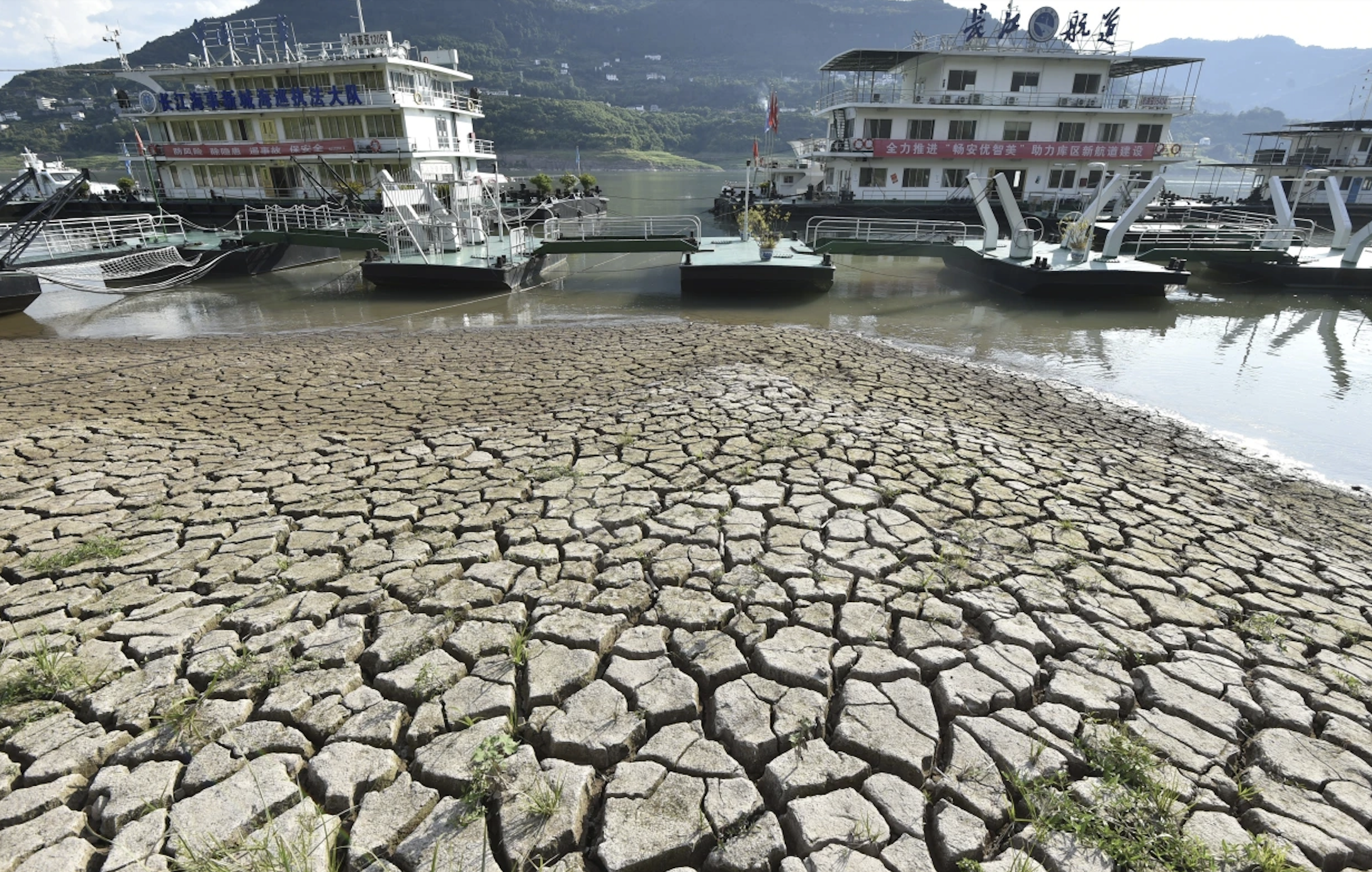
Source: NBC News, An exposed dried riverbed after the water level dropped in the Yangtze River in southwest China
Here is what netizens are saying about the heat wave in China
Undoubtably, the 2022 drought and heat wave in China has sparked new discussions on social media. Baidu searches for ‘Heat wave’ is more than twice as high as any previous year, and searches for ‘drought’ are more than triple than they have been in the previous three years.
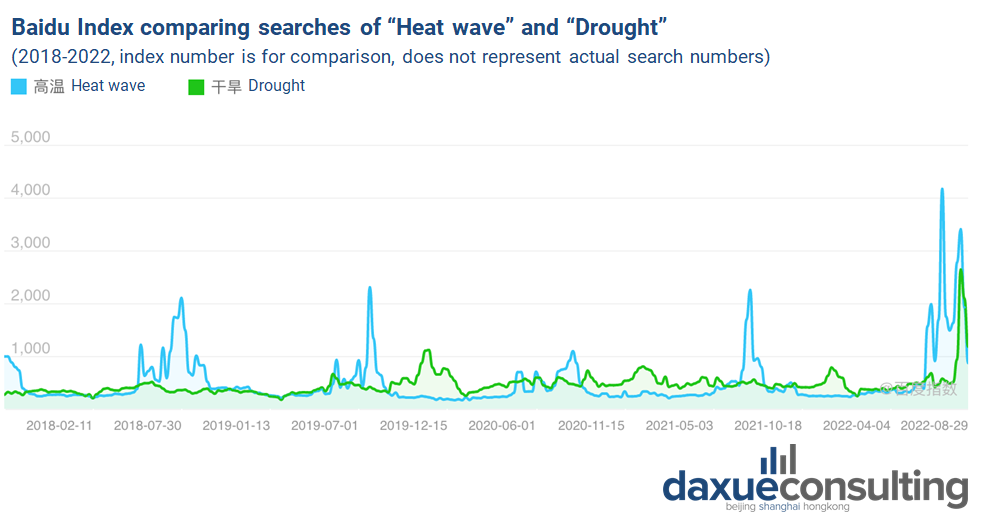
Source: Baidu index, analysis by daxue consulting, search index for ‘heat wave’ and ‘drought’
On Zhihu, the Chinese version of Quora, netizens described their personal experiences with the heat wave. One hot discussion topic was “Is 2022 unusually hot?” The user lived in Xi’an, a mid-southern city in China, and described that without AC installations at home, he spent the past summers using only electric fans; however, this year he turned on the air conditioning because of the extreme heat. “I feel like human beings can’t live without air conditioning anymore. That means the temperature has already exceeded the upper limit before”.
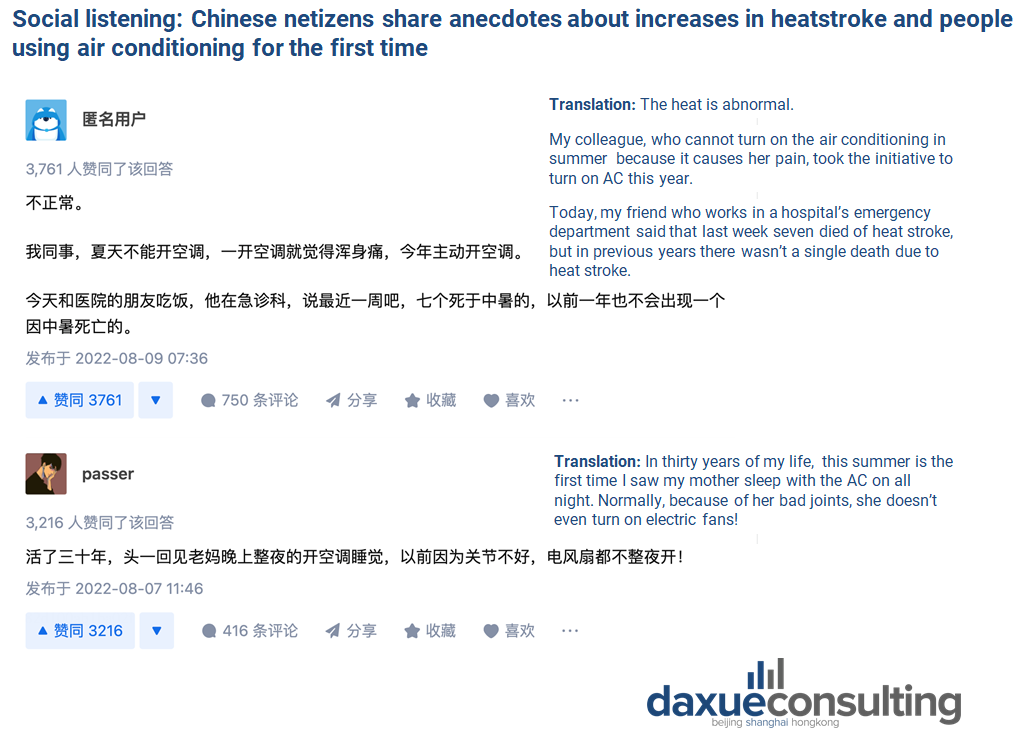
Source: Zhihu, Netizens share their experiences with the heat wave this year
Many shared similar personal experiences with the extreme heat. One anonymous netizen responded to the post, saying, “It’s unusual. My colleague, who was unable to bear the air-conditioning (because the cold air causes them pain), finally took initiative to turn on the AC this year. My friend who works at the hospital emergency said in the past week, seven died from heat stroke. In past summers, never did one die from heat stroke.”
Another user commented, “In my 30 years of life, it’s the first time I see my mom turning on AC all night to sleep. Before she didn’t even turn on fans because of her joint problems!”
In Traditional Chinese Medicine, using air conditioning, especially during the night, is linked to illness. Therefore, many Chinese people are hesitant to overuse air conditioning. However, the extreme heat is so unbearable, that many are willing to put up air conditioning related health problems just to cool down.
Based on Baidu index search frequency, in past years, “air conditioning illness” and “heat stroke” searches are normally around equal in frequency. However, this year, searches for heat stroke have far outnumbered air conditioning illness searches. This uncovers new priorities that citizens have in protecting their health during the heat wave in China.
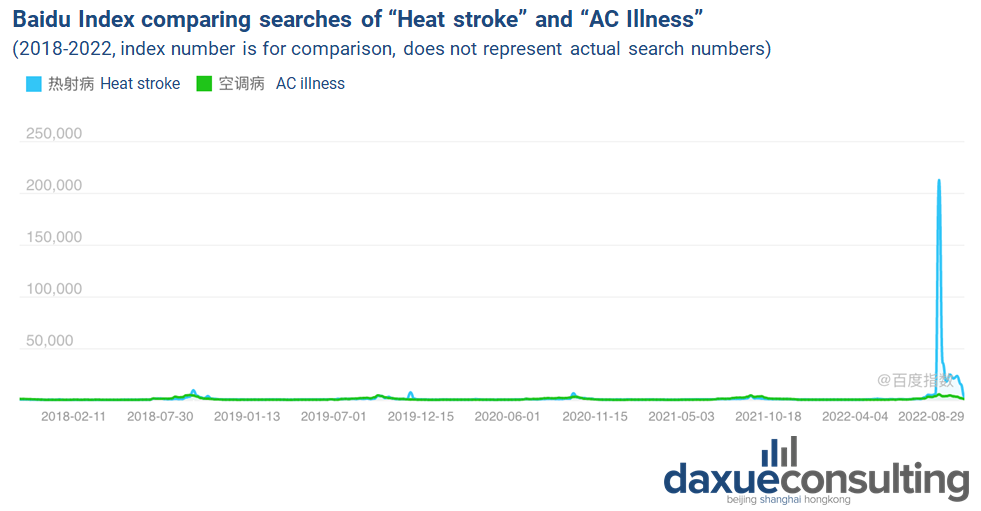
China’s heat wave sparks concern for the environment
Netizens, experiencing this extreme heat, advocated for the importance of environmental protection. For instance, under a post that discusses global warming, many advocated for environmental protection and save resources. In fact, in recent years, Chinese have growing awareness of sustainability. One comment was liked over four thousand times on Xiaohongshu: “There’s no need for professional validation that climate change is real. If everyone around the globe is feeling the abnormal climate, then the actual situation should be very severe already…”
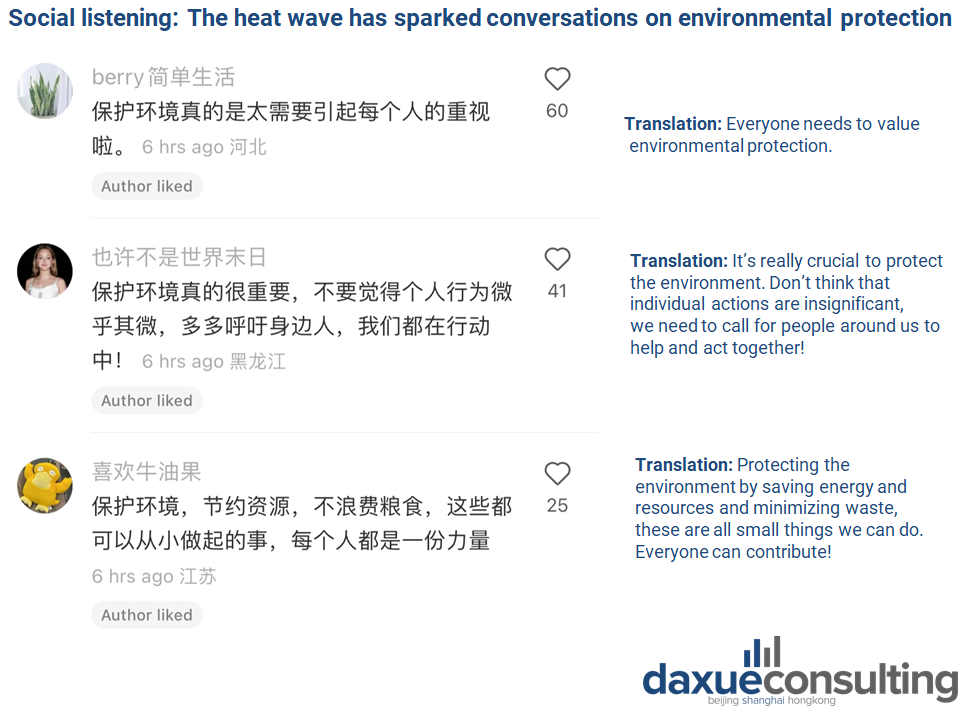
Source: Xiaohongshu, Netizens raising awareness for environmental protection
According to Daxue Consulting’s Green Guilt Report, there’s very few climate change deniers in China; however, there’s also not a lot of environmental activists. This event could push more people to speak out about environmentalism and become activists. One video on Xiaohongshu talks about the devastating effects of climate change and predicts that by 2,600, the earth would become a inhabitable “fire ball”.
However, many netizens maintained an indifferent attitude, stating “So lucky I’ll be dead by 2600”.
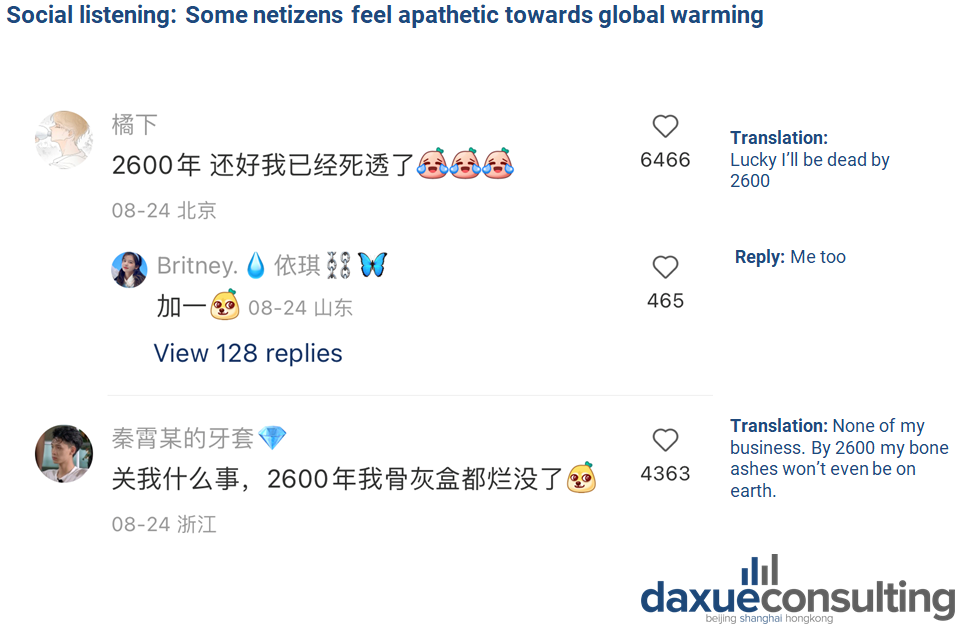
Source: Xiaohongshu, Netizen’s reaction to climate change video
Netizens call for the government to act and protect workers
In July, a construction worker in Xi’an died from heat stroke after continuously working in extreme heat for nine hours. His compensation was originally denied because he did not sign a contract; however, an outcry from Weibo netizens pressured the company to pay proper compensation to the man.
Many media publishers and netizens prompted local governments to strengthen policies that protect workers in high-temperature working environments. Although the Ministry of Human Services has published “Management measures to prevent heatstroke and cool down” as early as 2012, people.cn calls for more supervision from the department to actualize the policies. Similarly, netizens call to improve actual treatment and welfare for workers instead of verbal tributes.
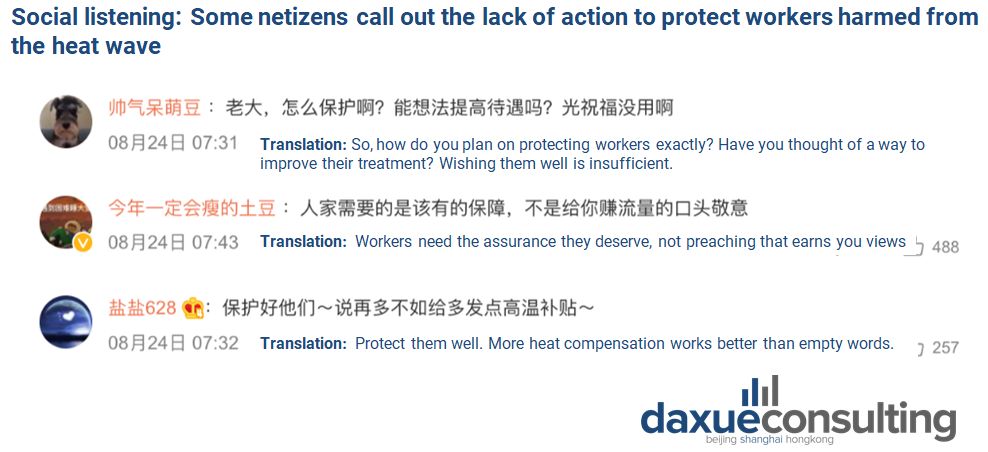
Source: Weibo, Netizen’s Advocating for Workers’ Actual Welfare
In June 2022, the Chinese government also updates its National Strategy for Climate Change Adaptation. The government recognizes that climate change is putting China’s society and economy at risk. A separate implementation plan complements the strategy and all local governments are expected to formulate more specific plans according to their own specificities.
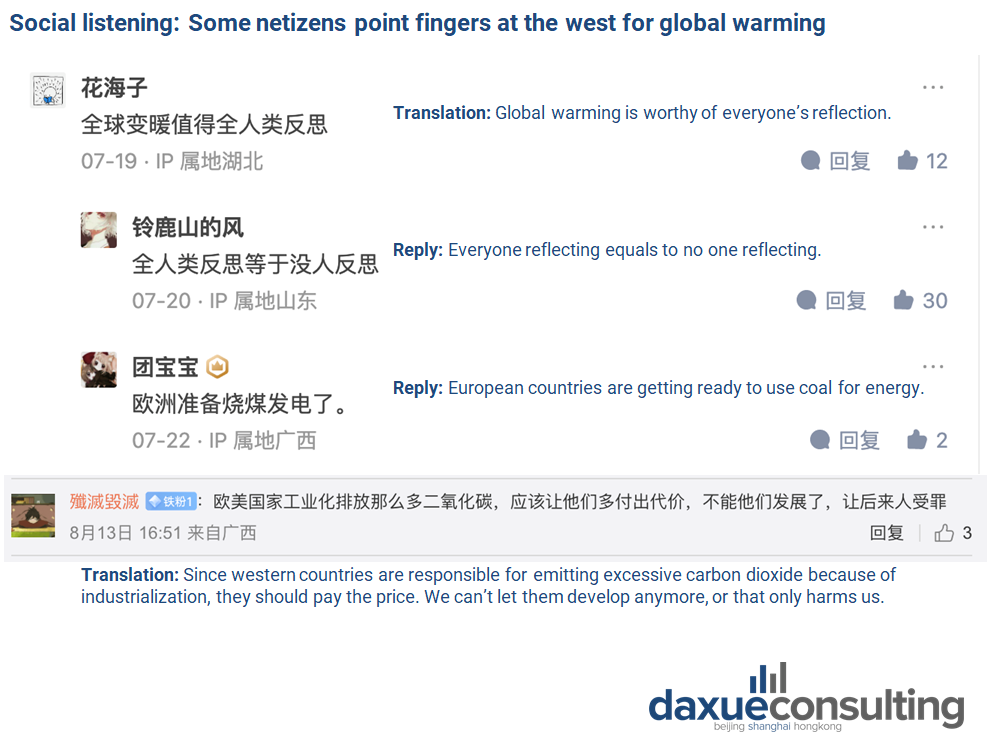
Source: Zhihu, translated by daxue consulting, some netizens point out the wests reliance on coal energy in relation to global warming.
Some blame the heat wave on Europe’s reactivation of coal power under a Weibo post that describes the severity of this year’s heat wave, one netizen commented, “Since European countries are responsible for emitting excessive carbon dioxide because of industrialization, they should pay the price. We can’t let them develop anymore or that only leaves us harm”. Some Chinese netizens blame climate change and heat waves on Western countries, as many were unsatisfied with Europe’s reactivation of coal power as their energy source. Many thought they were hypocritical. For instance, one netizen ironically responded to “Global warming is a problem valuable for all human beings to reflect on themselves” by ironically saying, “Europe is ready to use coal power as their energy source”.
What netizens reactions to the heat wave in China tell us consumers
- The heat wave in China has ignited conversations on environmentalism in China. Whereas previously, attitudes towards environmentalism have been lukewarm, events like this heat wave, may trigger stronger views towards protecting the environment.
- The heat wave has also drawn more attention to health and workers rights, and people are not satisfied with ‘wishing well’ of victims of heat stroke while working.
- Global warming could become another source of Chinese dissatisfaction with the west, as many feel the west is not doing enough to prevent global warming.





